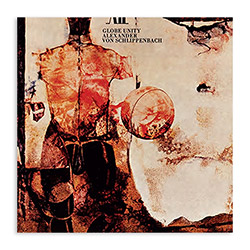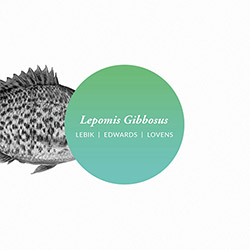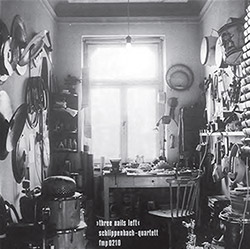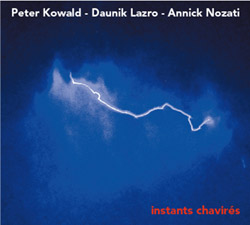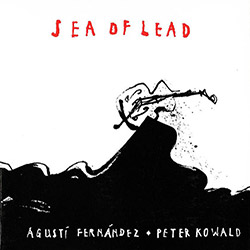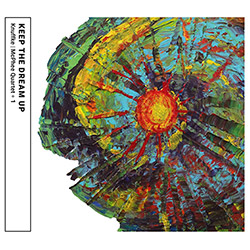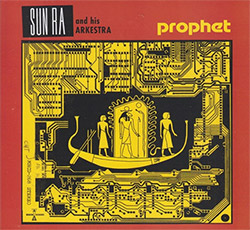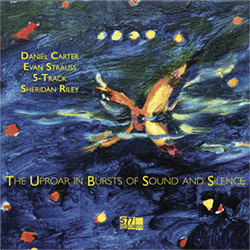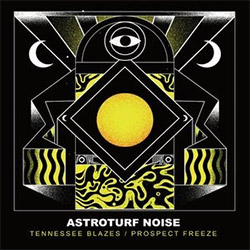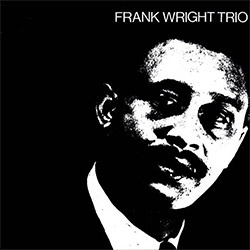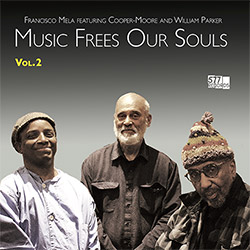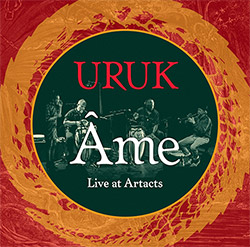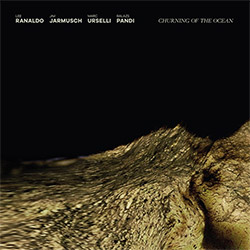![Pilz, Michel / Peter Kowald / Paul Lovens: Carpathes [VINYL] (Cien Fuegos) Pilz, Michel / Peter Kowald / Paul Lovens: Carpathes [VINYL] (Cien Fuegos)](https://www.teuthida.com/productImages/misc4/32350.jpg)
Reissuing the 1976 album on the German FMP Label, this trio session with Michel Pilz on bass clarinet, Peter Kowald on bass and Paul Lovens on percussion is an impressive example of the European Free Jazz scene of the time, all three musicians contributing compositions that unleash serious interplay of passionate expression and unorthodox approach to song structure and instrumental technique.
Save $3.60
Out of Stock
Quantity in Basket: None
Log In to use our Wish List
Shipping Weight: 24.00 units
Sample The Album:
Michel Pilz-bass clarinet
Peter Kowald-bass
Paul Lovens-percussion
Click an artist name above to see in-stock items for that artist.
UPC: 9120036683464
Label: Cien Fuegos
Catalog ID: CF 025LP
Squidco Product Code: 32350
Format: LP
Condition: New
Released: 2022
Country: Austria
Packaging: LP
Recorded in Berlin, Germany, on August 1st and 2nd, and September 7th and 8th, 1975, by Jost Gebers. Remastered by Martin Siewert. Originally released in 1976 as a vinyl LP on the German FMP label with catalog code FMP 0250.
"Carpathes is a really excellent record. Michel Pilz has a highly original sound on bass clarinet. One track I really like is "Willige Billie" on which Kowald sets up a modulating arco bass drone, Lovens plays some light, busy percussion and Pilz plays some fine bass clarinet, going right through its range. The two bass clarinet solo pieces on the record have similar 'shape' to some of Steve Lacy's soprano saxophone compositions/improvisations."-John Kieffer, Musics, February 1977
"Percussionist Paul Lovens turns in some exemplary work on "Carpathes", joined by Michel Pilz (bcl) and Peter Kowald (b). Actually it is mostly Pilz' date as he appears throughout the record either in solo, trio or duo with Kowald. But it is Lovens who most impresses me here as he hammers, rings, jingles the percussion, managing to both give rhythmic freedom and abstraction while implying a more traditional rhythm and he sustains himself very well. Actually the rhythm is constantly outstanding in of themselves, as they often function quite aside of a traditional rhythm role and I enjoy the use of Kowald's bass which is almost horn-like on some of the eight originals here (recorded in Aug. and Sept. 1975). Pilz' bass clarinet technique is beyond question and has its strong moments, but there are also moments of vagueness and groping - however in balance of the whole it is minor and detracts little from the seriousness and high quality of the entire work. There are times, and this record is one, where I would like to hear the FMP group do a more familiar work. Something like an Ellington composition I think would lend itself so well to the general fabric of this trio and would not only be an appropriate and inspiring vehicle, but also add to the richness of an already rich work."-Cadence Magazine # 3, March 1977
Artist Biographies
• Show Bio for Michel Pilz "Probably one of the most recognizable jazz musicians in Europe today, tall and lanky Michel Pilz and his long bass-clarinet are a popular club and concert feature.Considered early on as a successor to the great Eric Dolphy, Michel has dedicated his career exclusively to the mastery of this extraordinary woodwind. He was born in Germany (Bad Neustadt/Saale), and grew up in Luxembourg, where he studied classical clarinet at the conservatory. He then opted for a career in jazz playing the larger instrument, first joining the Manfred Schoof Quintet in 1968 (with Alex von Schlippenbach, Buschi Niebergall and Mani Neumeier). In the 1970's, Michel toured in the Near East, Asia and South America with the quintet, the "German All Stars," the "Globe Unity Orchestra," and, in Japan, with trumpeter Itaru Oki. Over the years, he has performed at numerous international jazz festivals, including Montreux, Bombay, Tokyo, Frankfurt and Chateau-Vallon. In October, 1999, his trio represented Germany at the European Jazz Festival in Damascus. Michel has produced several recordings, including, most recently, "Jamabiko" (MP 841) and "Melu-Sina" (Drops CD 16). His next CD, to be entitled "Arbor," will be out in early 2001. Today, Michel resides again in Luxembourg, where he teaches and plays local engagements. He also travels frequently for appearances in Germany, France, and elsewhere in Europe. He plays primarily with the Michel Pilz Trio, including Christian Ramond on bass and Klaus Kugel on drums. Itaru Oki often joins the group to form the Pilz-Oki Quartet for selected dates. The potential of music as a means of enhancing international understanding became clear to Michel with his first overseas experiences. He has consistently attempted to include local musicians in his international appearances, believing the promotion of such relationships to be a critical element in the musician's art." ^ Hide Bio for Michel Pilz • Show Bio for Peter Kowald "Born 1944 in Germany, died 21 September 2002 New York City; double bass, voice, tuba. Peter Brötzmann (Corbett, 1994) recounted that 'there was this young guy trying to play the bass, who was Mr Kowald, at that time seventeen years old. Peter lived with his parents. I had my little studio, so he was always hanging out at my place. But he had to be at home at 10.00, he was drinking milk. But we changed that, very soon. His parents were always very angry with me, because he never showed up at home anymore, he dropped studies of ancient languages, Greek and all that.' By this time (1962) Peter Kowald had been playing bass for two years and, with different drummers the two Peters were playing Mingus, Ornette, and Miles Davis things as well as listening to Coltrane, Stockhausen, Cage et al. Kowald was part of the European tour undertaken by the Carla Bley/Michael Mantler band in 1966 (also featuring Brötzmann) and then came work with other German musicians, membership of the Globe Unity Orchestra and the first recordings: Globe Unity, For Adolphe Sax and Summer 1967, recorded during a brief vacation in London. In particular, Evan Parker credits this visit to London for his invitation to play in the Pierre Favre/Irene Schweizer quartet and his subsequent longstanding involvement with German (and other European) musicians. Kowald's work with Brötzmann continued - on and off - on record at least, to the time of Kowald's death and included the Cooperative Trio with Andrew Cyrille, a duo on the Duos project and a recent mix of free jazz, hip-hop and rap. Peter Kowald was a member of Globe Unity Orchestra for 12 years (1966 to 1978) and for much of this time played less of a side-man role and more of an equal partner - for example, conducting the band - with the person to whom the group has become most associated, Alex von Schlippenbach. His influence is particularly noticeable on Jahrmarkt/Local fair where the two sides of composition are by Kowald (as is the second side of Live in Wuppertal and he is also credited, along with Paul Lovens as 'producing' the record, presumably sorting out the sprawling theatricality and poor sound into two 'meaningful' fragments. In his notes to 20th anniversary, Schlippenbach emphasises the importance of Kowald in creating a programme that became a lot more 'colourful'; while further pointing out that he and Kowald gradually drifted further apart 'until one fine evening after lengthy discussions which resulted in a fight in a pub in Wuppertal, this chapter also closed'. However, before this ending, from 1973 to 1978, Kowald also worked with the Schlippenbach trio (Schlippenbach/ Parker/Paul Lovens), turning it for much of this time into a regular quartet. Throughout his career, Peter Kowald worked with a wide variety of improvising musicians worldwide and in many considered and unusual situations. He recorded bass duets with Barry Guy, Barre Phillips, Peter Jacquemyn, Maarten Altena, Damon Smith and William Parker, released two solo bass recordings, and had regular groups with Leo Smith and Günter Sommer; with Joëlle Léandre and dancer Anne Martin (Trio Tartini); with dancers Cheryl Banks and Arnette de Mille and cellist Muneer Abdul Fataah (Music and Movement Improvisation); a trio with pianist Curtis Clark; a trio with Canadian alto saxophonist Yves Charuest and Louis Moholo; and Principle Life with Jeanne Lee, Klaus Hovman, and Marilyn Mazur. During the period 1980 to 1985 he was a member of the London Jazz Composers' Orchestra. He has spent periods in the US and in Japan and recorded three duo LPs (two CDs) with US, European and Japanese musicians. He also lived in Greece and similarly played and recorded with the Greek musicians Floros Floridis and Ilias Papadopoulos. By contrast, the 12 months May 1994 to May 1995 was designated Kowald's 'Year at home' project which comprised a mixture of solo works - out of which, to some extent, the last solo CD grew (Was da ist) - and group performances. In addition, Peter Kowald collaborated extensively with poets and artists and with the dancers Gerlinde Lambeck, Anne Martin, Tadashi Endo, Patsy Parker, Maria Mitchell, Sally Silvers, Cherly Banks, Arnette de Mille, Sayonara Pereira, and Kazuo Ohno. Specific works included Die klage der kaiserin (1989) with Pina Bausch, Short pieces (since 1989) with Jean Sasportes, The spirit of adventure (1990) with Anastasia Lyra, Wasser in der hand (1990/91) with Christine Brunel, and Futan no sentaku/The burden of choice (1990/91) with Min Tanaka and Butch Morris." ^ Hide Bio for Peter Kowald • Show Bio for Paul Lovens "Born in Aachen, Germany, 6 June 1949; Drums, percussion, musical saw, etc. Paul Lovens played the drums as a child. Self-taught, from the age of 14 he played in groups of various jazz styles and popular musics and from 1969 has worked almost exclusively as an improvisor on individually selected instruments. He has worked internationally with most of the leading musicians in free jazz and free improvisation, among whom have included the Globe Unity Orchestra, the Berlin Contemporary Jazz Orchestra, the Schlippenbach trio, Quintet Moderne, Company, and a duo with Paul Lytton. He has undertaken concert tours in more than 40 countries, is a founder member of a musician's cooperative and has produced recordings for his own label, Po Torch Records since 1976. He has worked with painter Herbert Bardenheuer. Despite very rare solo performances, and although giving occasional concerts with ad-hoc groups and an involvement in projects with film, dance and actors, Paul Lovens' main interest and work is musical improvisation in fixed small groups. In the mid-1990s these small groups numbered around 16, of which a few were part of a special selection, called 'vermögen'. Paul Lovens somehow epitomises the free drummer/percussionist who is not there to lay down the beat and kick everyone else into action but to listen, colour, contribute, guide, and occasionally direct, the overall cooperative sound. In concert one cannot fail to be moved by his intensity and concentration and there is an overiding feeling that even the most random events are somehow planned in time. In this respect, there is a nice irony that on the Nothing to read CD with Mats Gustafsson, Lovens describes his kit as consisting of 'selected and unselected drums and cymbals'. Miking seems to be a problem at times with some recordings giving him undue prominence and others insufficient. Good recordings are Elf bagatellen, Nothing to read, Pakistani pomade, and ,stranger than love." ^ Hide Bio for Paul Lovens
4/17/2024
Have a better biography or biography source? Please Contact Us so that we can update this biography.
4/17/2024
Have a better biography or biography source? Please Contact Us so that we can update this biography.
4/17/2024
Have a better biography or biography source? Please Contact Us so that we can update this biography.
Track Listing:
SIDE A
1. Un peu d'ail (10:36)
2. Krebsauel (4:28)
3. Inno chica chow (5:02)
4. Billiger Willi (3:29)
SIDE B
1. Willige Billie (7:36)
2. Carpathes (3:52)
3. Pikolo Fur Den Glockner Von Notre Dame (9:55)
4. Zythum (5:22)
Vinyl Recordings
Improvised Music
Jazz
Free Improvisation
European Improvisation, Composition and Experimental Forms
Trio Recordings
Jazz Reissues
Kowald, Peter
New in Improvised Music
Recent Releases and Best Sellers
Search for other titles on the label:
Cien Fuegos.


![Pilz, Michel / Peter Kowald / Paul Lovens: Carpathes [VINYL] (Cien Fuegos) Pilz, Michel / Peter Kowald / Paul Lovens: Carpathes [VINYL] (Cien Fuegos)](https://www.teuthida.com/productImages/full/32350.Full.jpg)

